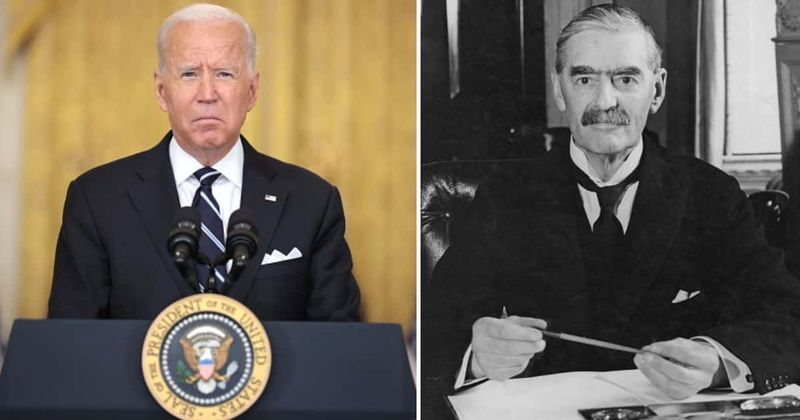Nov. 10 partnership agreement and failed resolve led to this crisis����
There is no question that Vladimir Putin is totally wrong with his unprovoked invasion of Ukraine and should be held liable for war crimes and restitution to Ukraine, should its gallant leader, Volodymyr Zelensky, pull out a victory in this war (assuming the Biden administration and NATO do not try to make him concede, which would set a bad precedent).
However, a U.S.-Ukraine Charter on Strategic Partnership, signed by U.S. Secretary of State Antony J. Blinken and Ukrainian Foreign Minister Dmytro Kuleba in Washington, D.C. on November 10, 2021, may have pushed Russia to military action. Besides failing in supporting domestic oil production and supporting the Russian Nord Stream 2 pipeline, this tidbit amounts to another epic fail on Biden�s part.
The key language in the Nov. 10 agreement was this:
�The United States supports Ukraine�s right to decide its own future foreign policy course free from outside interference, including with respect to Ukraine�s aspirations to join NATO.� In contrast, a similar partnership agreement with Ukraine signed by the Obama administration in December 2008 merely said the U.S. would help �strengthen Ukraine�s candidacy for NATO membership.�
Putin, being no different from past Russian leaders who are paranoid about invasions from the West, issued demands to retract the agreement.
In that same news report, it was duly noted some 70,000 Russian troops were massing on the Ukraine border. For some reason, this only made it to the 24-hour media cycle in early February, but it was evident NATO and the Biden administration could have sent supplies earlier and possibly, ships to the Black Sea, as this article notes was not done until late
In recent weeks, a number of experts in international relations and Russian history have pointed to the Blinken pact as the trigger for the war, which has led nearly 4 million Ukrainian citizens to flee, 950 civilian deaths and as many as 15,000 Russian battle casualties.
Oxford historian Robert Service, said it was �shambolic mismanagement� by the West to support Ukraine NATO entry given how much Russia, even before Putin took power in 1999, opposed it.
But in response to Putin�s protest, the State Department responded by stating: �all states respecting the right of other states to choose or change security arrangements, and to decide their own future and foreign policy free from outside interference.,, In this light, we reaffirm our commitment to NATO�s Open Door Policy under Article 10 of the Washington Treaty.�
In a recent �Boston Globe� article, Justin B. Hollander, a professor of public policy and planning at Tufts University, said this bureaucratic response is unreal, noting: �Geopolitical considerations have always weighed on how a country arranges its relationships with superpowers. For example, how free is Mexico is to align itself militarily with China?�
Hollander and others have argued NATO and the US must declare that they will not support Ukraine into NATO. But I have to ask � is it too late?
There are larger implications about settling this war in Putin�s favor to allow him to save face.
Invading another country without provocation is an act of desperation, but there have been several invasions in recent decades �most notably, Russia�s 2014 invading the Donbass and swiping Crimea from Ukraine.
So, by not demanding unconditional Russian surrender, are we not opening the door for other countries to invade neighbors to achieve some gain � i.e., China invading Taiwan?
It seems Biden�s appeasement foreign policy apparatus has forgotten a major tool of post-World War II foreign policy – deterrence.
Writing in �The Wall Street Journal,� Nadia Schadlow, a fellow at the Hoover Institution and the Hudson Institute, writes: �A credible deterrent is designed to alter a potential aggressor�s calculations of risk and reward. Vladimir Putin determined that the potential cost of invading Ukraine was relatively low, and on Feb. 24 he attacked.�
�Resolve costs nothing, but it is priceless when it comes to deterring aggression. By signaling that the U.S. had no intention of using its capabilities, the Biden administration seriously weakened their deterrent value.�
Sanctions, NATO unity and its massive military assistance � albeit late � has helped Ukraine fend off the Russian bear.
But while I dread direct U.S. armed conflict with Russia, it seems the fear of �escalating the conflict� has limited what the U.S. and NATO are willing and able to do to end it. As such, are we repeating the same mistakes Britain and France made in 1939 when Hitler and Stalin carved up Poland without any allied response?
Biden apologists will note that Ukraine is different because Russia has nukes and chemical weapons.
But fear of nukes didn�t stop President Kennedy from going to the brink with Khrushchev to get Soviet missiles out of Cuba, nor stop President Reagan from seeking a military buildup in the 1980s that led eventually to the demise of communism in Eastern Europe.
I just don�t see Biden going to the brink; he�s our Neville Chamberlain.

